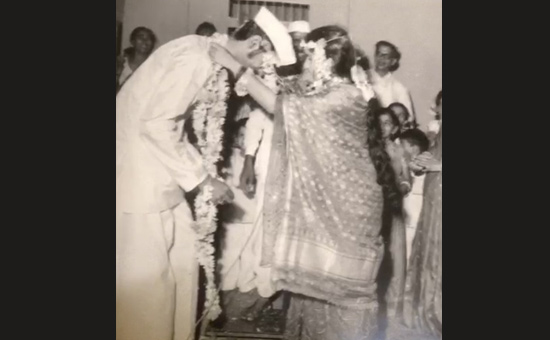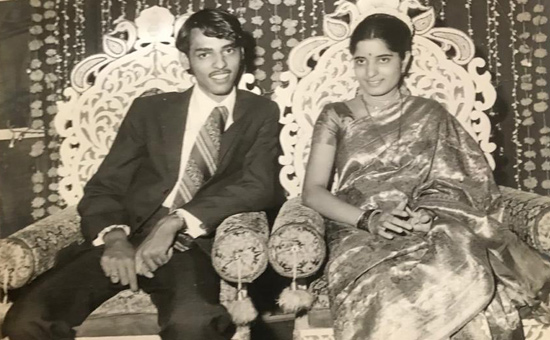-
Ujwal,
now 70, got married in the early 1970’s. He compares his wedding, both before
and after, with his kids who got married in early 2000’s. Written years ago it
captures the changes in India’ social milieu very well.
Marriage then and Now
My son got married four years back, which sort of makes me an expert on the
changing marriage environment in my own family in the 36 years since my
marriage. Here are a few of my observations as I write on the eve of my
daughter’s marriage.
AGE: THEN I was sub 23 admittedly young
even by those day standards, but the wife was hitting the 24th birthday and
there was no chance of getting further delays approved from her family. I had
bought two years by getting her to do a MBA post M.Sc and so the academic
window had also closed.
NOW...My daughter is in her late twenties and son had crossed thirty
when he tied the knot...Both the kids wanted financial security, time to enjoy
themselves, gain maturity, understand their own minds about what they expected
from a spouse, compatibility etc...
I almost feel irresponsible in hindsight. I was a Ph.d student making Rs
400, had no clue about what the future held, had not even thought of it, had
zero savings, no infrastructure barring an old lambretta (two wheeler).Was
actually living in a bachelor pad and stayed with wife’s sister in Pune for
seven days after we returned from the marriage so that I could find a house in
Nagpur where I was then working.
I had known my wife for four years. She and I were both doing M.Sc in
Biochemistry in Pune. We were comfortable with each other, but I am sure had
given no in depth thought to compatibility etc. I was a junior research fellow
when we got married, son was already CEO and daughter is a Manager in a
multinational, both their spouses are in high profile jobs...
Talking about housing, both my kids had intense debates with their
respective spouses four months before the wedding on the kind of a house they
needed, the location, the size, the dimensions, the ambience etc.
 Exchanging flower mala with wife.
Exchanging flower mala with wife.
Agreement took about four weeks and the hunt spanned across six to eight
weeks in which each of them saw atleast thirty to forty homes before finalising
one. Both wanted sea views and carparks. The house had to be furnished before
they moved in and that meant that my poor wife had to go first furniture and
curtain hunting with them and then go to their homes and wait for the white
goods to be delivered, installed, checked etc because the busybodies were at
work.
In our case, we found a house in seven days flat, a one room kitchen
with an independent bathroom outside the apartment. The only pieces of furniture
that we bought were from the weekly open air bazzar Mangalwari.
In Nagpur in the seventies these bazars would be conducted in different
parts of the city on different days of the week. Mangalwari representing the Tuesday
bazar and was reputed to have cheap furniture. We bought a baaz (a wooden cot
with ropes as the base) for fifteen rupees, three steel foldable chairs for
twenty rupees each, a steel table for Rs 75 and a stove for Rs 35 and we were
set. All in a day’s work.
Our scooter would be grandly parked just outside our drawing cum dining
cum bedroom. In the early parts of the month it went all over, but the poor
thing often times got forced rest towards monthend because there was no fuel
left and no money to refuel.
BACHELOR/BACHELORETTE NIGHTS
The concept did not exist in our times. His friends took him to Goa to binge and daughter had an all women party of which she was regaling us with the gory detail. I would certainly have been embarrassed to discuss the party with my parents if I had had one... In our times my Nagpur friends could not afford to come to Pune and so I gave them a party at what we considered a swanky restaurant "Ashoka' . Six of us went had a great meal and because this was a special occasion I treated them to a bottle of beer each. I still remember the bill was Rs 75 and that included 27 rupees for the beer.
 On the hot seat-reception.
On the hot seat-reception.
THE WEDDING PROPER
I was not involved in any planning at all. I just landed for the
wedding. My parents and the wife’s parents had agreed and executed. It was at
Udyan Mangal Karyalaya (UMK) supposedly the best Maharashtrian place in Pune.
UMK had innovated a new concept in Pune which was called CONTRACT. It
meant that the contractor took on all the responsibilities from arranging the
hall, wedding Guruji, all ceremonial requirements, band, photographer, marriage
registration and a sumptuous lunch with 5 sweets (panch pakwanna) for 100
guests. Those were rationing days and the law did not permit more than a
hundred guests. All this for a sum of Rs 4,000...This was expensive, if you
managed it on your own the costs could have perhaps been contained to Rs 3,000.Only
the more liberal Puneites indulged in this fancy contract concept.
For the daughter’s wedding I have to negotiate first with her on the
venue, It had to be open air, it had to have a great ambience, greenery,
waterbodies, trees etc etc. When we finally located one that met her standards
then there were the negotiations with tentwala, florist, caterer, live band, photographer,
mehendiwala, sari draper, hair dresser and in each of these I dared not make
decisions without consultation.
I made five trips to Delhi to finalise and supervise the arrangements. My
dad did not even stir out of Bangalore where he was then posted to look at the
arrangements (admittedly he was the grooms dad, but he insisted that he was
spending half the money of the marriage costs).
In our marriage the festivities were just on the day of the wedding
barring a small dinner for family the previous night. Now true national
integration seems to have happened in our family. Events like sangeet, mehendi
etc have come up and are expected not just by my friends but even by the parts
of the traditional Marathi family.
Guests coming for the marriage
were expected in our times stay in the Karyalaya in a huge dormitory like hall
or make their own arrangements. Today I have booked 50 plus rooms for guests
and will probably need to hire thirty cars to ferry guests.
Mercifully, I have good friends who are influential, and are treating it
as if it’s their own daughter’s wedding and a substantial part of my stay
arrangements have been made in company guest houses, state Bhavans, IIC etc
that did not cost the earth and are well located and comfortable. The Subroto
Park venue is amongst the most beautiful venues in Delhi.
A friend, Robert Chhetri, God bless him has taken complete charge of the
management. I am almost like a guest myself care free and confident that all
will go well.
HONEYMOONS
My honeymoon was three nights four days in Mahableshwar. The package
cost me Rs 370 including all meals. More importantly, we had the meals at the
hotel to conserve cash.... Son’s honeymoon was in Australia New Zealand for a
month and daughter chosen a ten day honeymoon in Bali. I have not dared to ask
them about costs involved, because I know they will consider an impingement on
their privacy in financial matters.
When I think about it we enjoyed our wedding as much as we enjoyed our
children’s. Times were different. Life was simpler. We did not know any better
and could not afford it anyway.
Now we can only hope and pray that the children’s marriages will be as
solid and happy as our own, and they learn that marriage is caring, sharing,
give and take and accepting that bonds of love help wage war against any
adversities that life throws.
PS. This was written over eleven years back just before daughter got
married. We now have four lovely grandkids who are the centre of our universe (son
has two and daughter two) and I needn’t have worried. Both son and daughter are
as happily married as we are and were.
Of the four friends who made the wedding so comfortable, two Raghu Menon
and Chandan Roy have passed on and are deeply missed. Yashodhan Parande and
Robert Chhetri continue to be as hospitable and helpful. Thanks to them all these
memories are so pleasant.
Author is a retired banker and was CEO of Pratham, an education initiative.